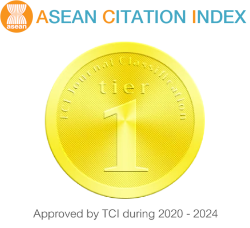Workplace Health Promotion and Non-Communicable Diseases Prevention Policies in Thailand: A Qualitative Study with Organization and Human Resource Executives
Keywords:
policy, health promotion, non-communicable disease, workplace, human resource managementAbstract
Background: The Cabinet of Thailand outlined a country reform plan (revised version) B.E. 2564 (2021). The plan focuses on policy and measures within the workplace, setting a goal to establish “workplace health policies.” A paucity of research on management, implementation and workplace health promotion; Thailand has yet to establish a national policy framework.
Objective: To study the collaborative policies within groups, clubs and associations as well as policy recommendations at both organizational and national levels, by organization and human resource executives, concerning health promotion and non-communicable disease prevention in workplaces.
Method: An explorative qualitative design, conventional content analysis with an inductive approach was performed. The data for analysis were collected through in-depth interviews conducted with organization and human resource executives affiliated with parastatal bodies such as the Federation of Thai Industries, the Thai Chamber of Commerce and Board of Trade of Thailand, the Personnel Management Association of Thailand, industrial estates, and workplaces. The data collection involved key informant interviews totaling 35 individuals representing 27 organizations between May and November 2022.
Results: The findings covered three main themes: 1) collaborative policies within groups, clubs, and associations; 2) financial policy recommendations; and 3) non-financial policy recommendations.
Conclusion: Groups, clubs, and associations encompassed collaborative projects and joint activities. Financial policy recommendations emphasized the granting tax privileges to both businesses and individual taxpayers engaged in health promotion with conditions. This included the allocation of public funds for health promotion in workplaces and employments, as well as issues related to the social security fund. Non-financial policies encompassed knowledge management and practice guidelines that aimed to ensure operational implementation, evidence-based research, public relations, access to advisory services, and awarding the businesses that implemented diverse health promotion initiatives.
References
United Nations. Sustainable Development Goal 3: Good Health and Well-being 2021 [cited 2022 Oct 11]. Available from: https://thailand.un.org/th/sdgs/3.
NCD Countdown 2030 collaborators. NCD Countdown 2030: pathways to achieving Sustainable Development Goal target 3.4. Lancet. 2020;396(10255):918-34.
World Health Organization. Ottawa charter for health promotion. Geneva: World Health Organization; 1987.
National Reform Plan on Public Health, Revised Edition B.E. 2564, (Feb 25, 2021). (in Thai)
Ratanachina J, Sithisarankul P. A study of workplace health promotion and non-communicable disease prevention roles and support among organizational leadership and human resource executives. Nonthaburi: Health Systems Research Institute; 2023. (in Thai)
Williden M, Schofield G, Duncan S. Establishing links between health and productivity in the New Zealand workforce. J Occup Environ Med. 2012;54(5):545-50.
Anderson DR, Whitmer RW, Goetzel RZ, Ozminkowski RJ, Dunn RL, Wasserman J, et al. The relationship between modifiable health risks and group-level health care expenditures. Health Enhancement Research Organization (HERO) Research Committee. Am J Health Promot. 2000;15(1):45-52.
National Statistical Office. Labor force statistics 2021 [cited 2022 Aug 7]. Available from: https://ittdashboard.nso.go.th/preview2en.php?id_project=101.
Wongrathanandha C, Singha S, Prasertsri L, Surangsrirat D, Hemaratpitak N, Hanvoravongchai J. Knowledge review: a project to development policies and models of health and safety promotion in the workplace under employment system and the Universal Coverage Scheme. Nonthaburi: Health Systems Research Institute; 2022. (in Thai)
Eckstein H. A culturalist theory of political change. The American Political Science Review. 1988;82(3):789-804.
Stock Exchange of Thailand. Industry grouping and business categories 2022 [cited 2022 May 2]. Available from: https://www.set.or.th/en/listing/equities/industry-sector-classification.
Vargas AM. Applying labour law to micro, small and medium-sized enterprises: a comparative study of 16 countries [internet]. no date [cited 2023 Feb 4]. International Labour Organization. Available from: https://www.ilo.org/legacy/english/intserv/working-papers/wp009/index.html.
Hsieh H-F, Shannon SE. Three approaches to qualitative content analysis. Qualitative Health Research. 2005;15(9):1277-88.
Occupational Safety, Health, and Environment Act B.E. 2554 (2011). (Jan 17, 2011). (in Thai)
Skill Development Promotion Act B.E. 2545 (2002). (Oct 1, 2002). (in Thai)
Thai Health Promotion Foundation. Happy 8 Workplace Bangkok [cited 2023 Feb 2]. Available from: https://happy-8workplace.thaihealth.or.th. (in Thai)
Sithisarankul P, Hengpraprom S. Workplace health promotion in Thailand. Asian-Pacific Newsletter on Occupational Health and Safety. 2013;20(1):4-7.
Burton J. WHO healthy workplace framework and model: background and supporting literature and practice. Geneva: World Health Organization; 2010.
World Health Organization. Milestones in Health Promotion Statements from Global Conferences. 2009.
World Health Organization. The Bangkok Charter for Health Promotion in a Globalized World. The 6th Global Conference on Health Promotion; Bangkok, Thailand 2005.
World Health Organization, World Economic Forum. Preventing noncommunicable diseases in the workplace through diet and physical activity WHO/World Economic Forum report of a joint event. Geneva: World Health Organization; 2008.
Rojatz D, Merchant A, Nitsch M. Factors influencing workplace health promotion intervention: a qualitative systematic review. Health Promot Int. 2017;32(5):831-9.
European Network for Workplace Health Promotion. The Luxembourg Declaration on Workplace Health Promotion in the European Union. 2007.
Kondracki NL, Wellman NS, Amundson DR. Content analysis: review of methods and their applications in nutrition education. J Nutr Educ Behav. 2002;34(4):224-30.
Downloads
Published
How to Cite
Issue
Section
License
Copyright (c) 2024 Journal of Health Systems Research

This work is licensed under a Creative Commons Attribution-NonCommercial-NoDerivatives 4.0 International License.
Journal of Health Systems Research is licensed under a Creative Commons Attribution-NonCommercial-NoDerivatives 4.0 International (CC BY-NC-ND 4.0) license, unless otherwise stated.




